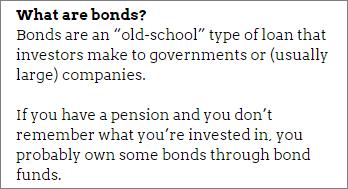To get the best lending results, compare all P2P lending and IFISA providers that have gone through 4thWay’s rigorous assessments.
How Much Should You Invest in Peer-to-Peer Lending?
Benjamin Graham was a highly intelligent investor who basically invented the most successful way to invest in shares.
He didn't go for all the complexity of many of his other colleagues in his industry. Just like all highly successful long-term investors that we know of, he kept it simple.
The simplicity of Graham's strategy  extended not just to how he picked shares and bonds, but to how he decided to split his money between them.
extended not just to how he picked shares and bonds, but to how he decided to split his money between them.
(See sidebox for a brief definition of bonds.)
Straight 50-50 split
In his books, The Intelligent Investor and Security Analysis (co-written with David Dodd), Graham recommended that most of the time you might have a simple split of 50-50 between shares and bonds.
If he was investing today, in the UK, I doubt Graham would be doing anything more fancy; but he probably would dump bonds and invest in peer-to-peer lending, where the risk and reward profile is more attractive, as my colleague demonstrated in Peer-to-Peer Lending Vs Other Investments.
Bond investing over the very long run has proven to be far less rewarding after costs than Benjamin Graham could have known back then. In large part, it's probably because costs have risen as more people invest through funds with extra layers of costs that Graham did not contend with.
But P2P lending has provided exceptional returns since the beginning, and highly stable returns every year since 2005. And it isn't subject to multiple additional layers of costs that reduce those returns. It's also got an excellent, very long-term record, as banks and non-bank lenders have been doing these sorts of loans successfully for a very, very long time.
Switching to 75-25
In times where adventurous investors have strong convictions about what's going to happen and are confident that shares will do well, you might go up to 75-25.
And vice versa.
If shares are obviously (to you) extremely overpriced but interest rates are around a fair level in P2P lending, you could shift towards more lending instead.
This is exactly what Graham said, but, again, I'm substituting disappointing bonds for P2P lending.
One size doesn't quite fit all
I can't just say that 50-50 or 75-25 is for everyone. We're all different.
For example, you still need to keep several months' income for emergencies and set aside money for upcoming expenses. Savings accounts (including cash ISAs, which are tax-free savings accounts) are a good place to save for these things.
In addition, your current financial and life status, and your goals, will impact how much you invest in peer-to-peer lending and in shares.
As your investing horizons get smaller, you need to consider investing less in shares, which are a long-term investment.
As the horizon gets even shorter – say, below 3-5 years – you need to consider reducing your holding in peer-to-peer lending too, and having more in the bank.
If you have grown a large enough pot and now want to lock in gains and reduce risk, perhaps to live off the income, it makes sense to shift to lower-risk investments. This means more safer P2P lending options over shares.
Some P2P lending companies have risks comparable to the stock market and your risks are also higher if you don't use a simple strategy. So we're generalising when we call P2P lending lower risk than shares. However, it's relatively easy spot the high risk ones and focus on the ones that better suit you.
Read more
Read our 10 Core P2P Lending Guide pages for more on your lending strategy.
Independent opinion: 4thWay will help you to identify your options and narrow down your choices. We suggest what you could do, but we won't tell you what to do or where to lend; the decision is yours. We are responsible for the accuracy and quality of the information we provide, but not for any decision you make based on it. The material is for general information and education purposes only.
We are not financial, legal or tax advisors, which means that we don't offer advice or recommendations based on your circumstances and goals.
The opinions expressed are those of the author(s) and not held by 4thWay. 4thWay is not regulated by ESMA or the FCA. All the specialists and researchers who conduct research and write articles for 4thWay are subject to 4thWay's Editorial Code of Practice. For more, please see 4thWay's terms and conditions.


